Please order any of these with our BookNotes newsletter special, 10% off, by using the links below.
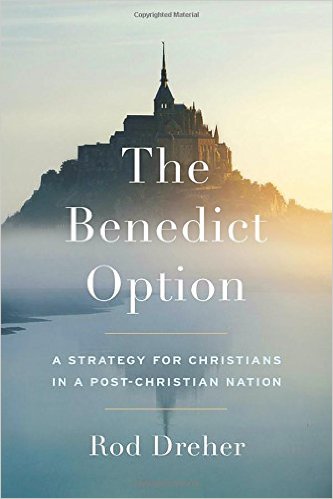 THE BENEDICT OPTION WIDELY DISCUSSED
THE BENEDICT OPTION WIDELY DISCUSSED
I hope you read our last BookNotes newsletter where I explained at least seven things to know about Rod Dreher’s new book, The Benedict Option: A Strategy for Christians in a Post-Christian Nation. I like Rod, appreciate his concerns about the quality and depth of substantive discipleship within our churches although have mixed feelings about his assessment of the culture in these days, in what Charles Taylor calls “a secular age.” As Michael Wear (Reclaiming Hope) said in this panel discussion on the book sponsored by First Things and The Plough it may be that Rod doesn’t adequately grapple with Taylor’s own thesis about the tone of the times (and how it is, oddly, not all utterly secular.) Again, I think James K.A. Smith’s How (Not) to Be Secular is a very helpful, if deep, study of this heady Canadian philosopher and the implications of his work, and Dreher might have pointed readers in his direction.
Further, I have very mixed evaluations of Dreher’s strategy of “limited withdrawal” although (as Andy Crouch very succinctly observed in his “The Benedict Option in Percentages“) too many seem to be obsessed with the “do we head for the hills?” question. There is a whole lot more in the book — both in terms of critical cultural evaluation and in terms of a call for more robust spiritual formation to withstand the pressures of modernity — that deserves our attention. Even (maybe especially) those of us who disagree with his evaluation of the Supreme Court opinion in Obegefell or his proposals about starting alternative classical schools, or even his fretting about cell phones, istuff, on-line culture, and the pace of life these digital days should study his arguments and discern how to respond to his counter-cultural, crunchy con, rallying cry. We have it on sale and can send it right out.
I am sure Rod is heartened by the conversations the book’s release last week has sparked and as an ecumenical bookseller — there’s not that many of us out there, although Rod gives a gloriously nice (and well deserved) shout-out to Warren and his crew at Eighth Day Books in Wichita — I, too, am heartened. To see evangelicals and Episcopalians, Kuyperian Reformed folks and lots of Roman Catholics, reading an Eastern Orthodox lay person talk about The Jesus Prayer and early monasticism and current spiritual formation programs that are more-or-less monastic all to inform how we might think about our public witness is fabulously exciting to me. That the fancy forum in New York (that I linked to above) was sponsored by the rigorously orthodox and socially conservative First Things and the Anabaptist folks from The Bruderhof communities as well as the political journal Rod edits, The American Conservative was just fantastic.
If only Sojourners or Evangelicals for Social Action had been invited. Or somebody like Gary Haugen (Good News About Injustice, Just Courage, The Locust Effect) or Bethany Hanke Hoang (The Justice Calling) or Jena Lee Nardella (One Thousand Wells) or micro-financier Peter Greer (Mission Drift, Entrepreneurship for Human Flourishing, The Spiritual Danger of Doing Good) or urban pastor Mark Gornik (To Live in Peace) or racial reconciliation leader John Perkins (and his brand new book Dream with Me: Race, Love, and the Struggle We Must Win)
or evangelical (and Republican, btw) creation-care activist Mitch Hescox (Caring for Creation) were asked to respond to Rod’s big pitch. Man, I wish they’d have had Lisa Sharon Harper (The Very Good Gospel) talking about what, exactly, is good news. I’d like to hear from these kinds of front line activists who are called to the world in urgent ministries of relief, development, peacemaking and justice. We know (because he says it all the time, in the book and in his talks) that he cares about racial injustice and about concern for the poor; yet, still, his “hunker down” in an “ark” lingo seems not to imply as much. It leads to what I called in my review as a “mixed message.”
Kudos to the First Things/Plough forum for having Jacqueline C. Rivers on the panel; she not only brought the voice of a woman and African American but knows well about street level ministries of social transformation. She and her husband, Eugene Rivers, have done remarkable work with gangs in the harshest urban settings. They also have experimented with intentional community and, influenced by historic black Pentecostalism, know better than most about the power of God in bringing healing and hope to the hurting and marginalized. They have experienced some of the attacks Rod talks about in his book because — despite their radical justice stance and nonviolent work with street gangs — they are, it seems, fairly conventional in their views of sexuality. Alas, their justice work is attacked by the hard left…
But, this is good, having these various views and voices responding to Rod’s important book.
Which, again, is to say that we at Hearts & Minds are thrilled seeing stuff we so deeply care about – ecumenism, spiritual and contemplative formation, cultural analysis, social concern, in intentional community – coming together in the panels and forums and articles and reviews popping up all over around The Benedict Option.
As you might guess, I’ve got a ton of books I want to offer alongside any reading of The Benedict Option or any proposals about the movement the hip ones are calling the BenOp. I snuck plenty of them into my own review last week — mentioning in passing books by Andy Crouch, Steve Garber, Makoto Fujimura, Richard Mouw, Brian Walsh, Jamie Smith, N.T. Wright, Os Guinness, James Davidson Hunter — and I am adamant that books by these authors are simply must-reads in this or any age.
And, I’d also say that if I were to convene a panel or discussion about The Benedict Option book and movement, I’d love to hear how anyone can imagine as faithful even a “limited withdrawal” strategy 

BOOKS ABOUT SPIRITUAL FORMATION AND DEEP HOLINESS
For now, though, it strikes me that it might be more helpful for most BookNotes readers – who know well our advocacy for the aforementioned titles about worldview and culture and social renewal — to list some books about Benedict of Nursia, Benedictine spirituality, and the ways some contemporary authors are inviting us to a neo-monastic lifestyle. This has been a thing for decades, inspired by the likes of Thomas Merton, Henri Nouwen, Richard Foster and, recently, Ruth Haley Barton, and while they may not be the sort Dreher likes, many of us might be happy to know there are books like My Mini-Van is My Monastery. Not driven by a reaction to political pressures, not emerging from anxieties about the culture, these authors – like Dreher’s book at its best – are not giving us tools only to resist the secularization of 21st century life or practices that are weapons to covertly fight some culture wars but are merely saying this is the best way to life the Christian life. We all need a dose spirituality as taught by some monks and religious and we all need a dose of community, accountability, maybe even the habit of submitting to a rule of life.
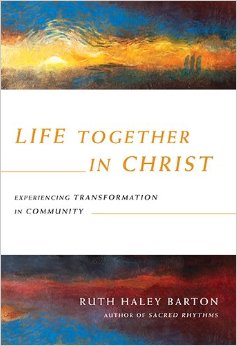
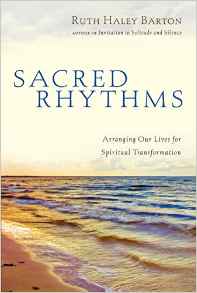 If any of this speaks to you but you’ve not read anything along these lines, I suggest you might start with Sacred Rhythms: Arranging our Lives for Spiritual Transformation by Ruth Haley Barton (IVP; $19.00) and her great book about doing these classic practices in community, with others, Life Together in Christ: Experiencing Transformation in Community (IVP; $18.00.) Or, somewhat deeper, the true classic Celebration of Discipline: The Path to Spiritual Growth by Richard J. Foster (HarperSanFrancisco; $25.99.) Perhaps you could use the marvelously rich and very helpfully arranged and annotated books by Foster Spiritual Classics and/or Devotional Classics (both published by Harper; $17.99 each.) All of these are influenced, naturally, by Benedict, but none are exclusively Benedictine.
If any of this speaks to you but you’ve not read anything along these lines, I suggest you might start with Sacred Rhythms: Arranging our Lives for Spiritual Transformation by Ruth Haley Barton (IVP; $19.00) and her great book about doing these classic practices in community, with others, Life Together in Christ: Experiencing Transformation in Community (IVP; $18.00.) Or, somewhat deeper, the true classic Celebration of Discipline: The Path to Spiritual Growth by Richard J. Foster (HarperSanFrancisco; $25.99.) Perhaps you could use the marvelously rich and very helpfully arranged and annotated books by Foster Spiritual Classics and/or Devotional Classics (both published by Harper; $17.99 each.) All of these are influenced, naturally, by Benedict, but none are exclusively Benedictine.
If Dreher’s BenOp project is not mostly about cultural withdrawal but enriching the depth of spiritual formation to fund authentic Christian living in our secularized world, we could always recommend books such as The Glorious Pursuit: Embracing the Virtues of Christ by Gary Thomas (NavPress; $14.99) 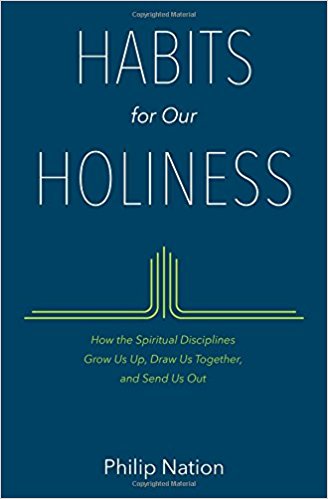
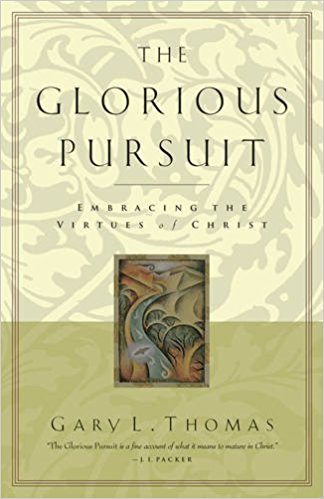 or Habits for Our Holiness: How the Spiritual Disciplines Grow Us Up, Draw Us Together, and Send Us Out by Philip Nation (Moody Press; $14.99.) And we’ve recommended, ad nauseam, you might think, Jamie Smith’s You Are What You Love: The Spiritual Power of Habit (Brazos Press; $19.99.) And Michael Wear, in the link offered above, slide in an excellent reminder about the formative work of Dallas Willard, such as Renovation of the Heart, The Spirit of the Disciplines, or his rather dense The Divine Conspiracy, parts one and two. I hope these kinds of books are the natural next steps for anyone wanting to be more deeply transformed by Christ in order to endure the hardships and quandaries documented in Dreher’s alarming book.
or Habits for Our Holiness: How the Spiritual Disciplines Grow Us Up, Draw Us Together, and Send Us Out by Philip Nation (Moody Press; $14.99.) And we’ve recommended, ad nauseam, you might think, Jamie Smith’s You Are What You Love: The Spiritual Power of Habit (Brazos Press; $19.99.) And Michael Wear, in the link offered above, slide in an excellent reminder about the formative work of Dallas Willard, such as Renovation of the Heart, The Spirit of the Disciplines, or his rather dense The Divine Conspiracy, parts one and two. I hope these kinds of books are the natural next steps for anyone wanting to be more deeply transformed by Christ in order to endure the hardships and quandaries documented in Dreher’s alarming book.
BOOKS ABOUT BENEDICT AND HIS RULE
Here, however, are some books that are not about spiritual formation generally, but specifically about Benedict. If anybody is interested in more of what Rod Dreher is proposing (or perhaps what he ought to be proposing if he is serious about appropriating Benedictine theology and spirituality) these books are worth knowing about. Why don’t you order one or two and commit to reading up? And then find a local monastery and pay them a visit. All are 10% off and you can order them below, or by giving us a call.
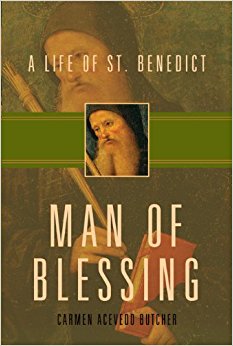 Man of Blessing: A Life of St. Benedict Carmen Acevedo Butcher (Paraclete Press) $21.95 Although not out of print, we have a few of these stellar biographies still in stock. Phyllis Tickle wrote, “Here medievalist Butcher revives the craft of hagiography, but with a twist. Her affection for her subject is as appealing as it is unfailing, but in this gentle retelling of Benedict’s life, it is Butcher’s familiarity with late Roman literature and culture that roots the saint and his miracles in a well-defined time and place.” There was a sixth-century volume called Dialogues about Benedict written by Pope Gregory the Great and this book draws on that, making it an important historical work.
Man of Blessing: A Life of St. Benedict Carmen Acevedo Butcher (Paraclete Press) $21.95 Although not out of print, we have a few of these stellar biographies still in stock. Phyllis Tickle wrote, “Here medievalist Butcher revives the craft of hagiography, but with a twist. Her affection for her subject is as appealing as it is unfailing, but in this gentle retelling of Benedict’s life, it is Butcher’s familiarity with late Roman literature and culture that roots the saint and his miracles in a well-defined time and place.” There was a sixth-century volume called Dialogues about Benedict written by Pope Gregory the Great and this book draws on that, making it an important historical work.
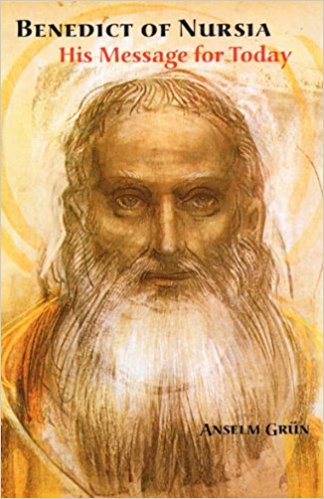 Benedict of Nursia: His Message for Today Anselm Grun (Liturgical Press) $12.95 This is a serious but slim book by one of the great European spiritual writers these days; we carry a number of books, including a few children’s books. This is partially an introductory biography and also a bit of a cultural study suggesting why Benedict’s message resonates so today. He is, by the way, a cellarer, or supplies manager, for his monastery in Germany, so knows much about work, administration, and the like. Maybe he might remind you of Brother Lawrence and his situation, finding God in the kitchen and insisting the pots and pans are holy.
Benedict of Nursia: His Message for Today Anselm Grun (Liturgical Press) $12.95 This is a serious but slim book by one of the great European spiritual writers these days; we carry a number of books, including a few children’s books. This is partially an introductory biography and also a bit of a cultural study suggesting why Benedict’s message resonates so today. He is, by the way, a cellarer, or supplies manager, for his monastery in Germany, so knows much about work, administration, and the like. Maybe he might remind you of Brother Lawrence and his situation, finding God in the kitchen and insisting the pots and pans are holy.
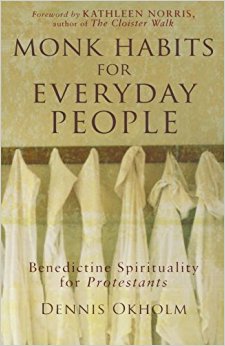 Monk Habits for Everyday People: Benedictine Spirituality for Protestants Dennis Okholm (Brazos Press) $16.00 I am assuming that many who read Rod Dreher’s The Benedict Option
Monk Habits for Everyday People: Benedictine Spirituality for Protestants Dennis Okholm (Brazos Press) $16.00 I am assuming that many who read Rod Dreher’s The Benedict Option
haven’t really studied monastic spirituality all that much; Protestant
or Catholic or Orthodox, we just haven’t taken up these “monk habits”
very carefully, if at all. Of course, the marvelous play on words in
the title of this one tells us much -it isn’t about wearing habits but
about adopting formative practices that Benedictine monks might teach
us. This is a very good book, with a foreword by Kathleen Norris and a
great blurb by historian Mark Noll. This is exactly the sort of thing
Dreher commends and Okholm’s visits have enabled him to interpret
Benedictine spirituality very, very well for those unfamiliar with it.
Okholm was raised as a Pentecostal and Baptist, and now is an
evangelical Presbyterian and a professor of theology. He was deeply
struck the first time he stayed at a Benedictine abbey and found much to
learn for his own personal walk with God, which he has been exploring
for years, now. As it says in the promotional material about the book,
Vital
aspects of devotion, humility, obedience, hospitality, and evangelism
took on new clarity and meaning. Paralleling that experience, Okholm
guides the reader on a focused and instructive journey that can
revitalize the devotional life of any Christian who wants to slow down
and dig deeper.
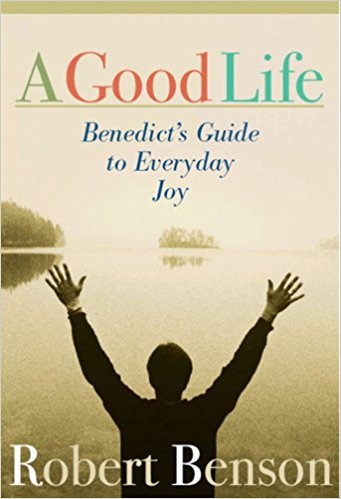 A Good Life: Benedict’s Guide to Everyday Joy Robert
A Good Life: Benedict’s Guide to Everyday Joy Robert
Benson (Paraclete Press) $13.95 I suppose I can’t expect you to
remember the oodles of books we rave about here, but I have, I hope
somebody recalls, often recommended the good work of the eloquent, clear
writer Robert Benson. I have so enjoyed every one of his books, and
commend them all, especially titles like the exquisite Between the Dreaming and the Coming True and Living Prayer and his recent Punching Holes in the Darkness. A Good Life is one we really recommend as maybe the most delightful, short, and wise book about
living well in light of The Rule of Saint Benedict. This is short and sweet, inspiring, ideal for ordinary folks.
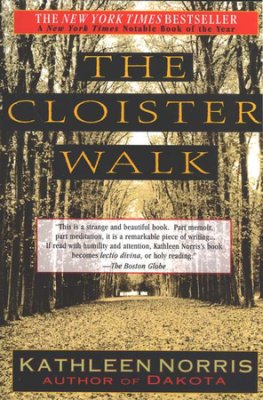 The Cloister Walk Kathleen Norris (Riverhead Books) $16.00 One of the most popular spiritual writers of recent decades, her spiritual memoir, Dakota, capitulated her to fame within mainline denominational circles, especially, but this story of a Presbyterian’s extended stays at a Benedictine monastery is perhaps her best known book. Here, she walks us through what it was like for her, with meditations on the Rule, of course, luminous reflections on the bigger picture of liturgical calendar, but also the ordinary stuff – the monk’s jokes, the food, the sense of time as one is immersed in this alternative world, her love for the liturgy. The Chicago Tribune’s review said, “Norris continues to write plainspoken meditations that expand the purview of non-fiction… She writes about religion with the imagination of a poet…” It is a good read for those who like spiritual autobiography and creative nonfiction, and it’s a very good window into the real world life of a Minnesota Benedictine monastery.
The Cloister Walk Kathleen Norris (Riverhead Books) $16.00 One of the most popular spiritual writers of recent decades, her spiritual memoir, Dakota, capitulated her to fame within mainline denominational circles, especially, but this story of a Presbyterian’s extended stays at a Benedictine monastery is perhaps her best known book. Here, she walks us through what it was like for her, with meditations on the Rule, of course, luminous reflections on the bigger picture of liturgical calendar, but also the ordinary stuff – the monk’s jokes, the food, the sense of time as one is immersed in this alternative world, her love for the liturgy. The Chicago Tribune’s review said, “Norris continues to write plainspoken meditations that expand the purview of non-fiction… She writes about religion with the imagination of a poet…” It is a good read for those who like spiritual autobiography and creative nonfiction, and it’s a very good window into the real world life of a Minnesota Benedictine monastery.
You may want to know that Kathleen Norris partnered with the wonderfully beloved, Catholic, children’s book writer and illustrator Tomie dePaola to do a wonderful children’s picture book called The Holy Twins: Benedict and Scholastica, which is so sadly out of print. Yep, Benedict was a twin and his sister Scholastica is an important figure in her own right.

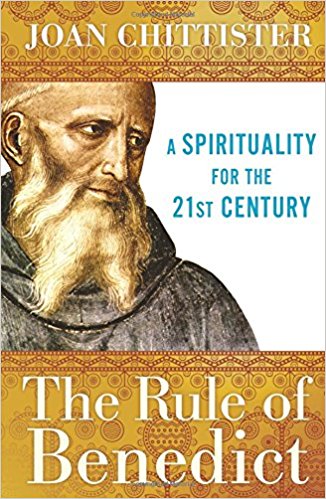 The Rule of Benedict: A Spirituality for the 21st Century Joan Chittister (Crossroad Publishing Co.) $16.95 This is a book that looks very nice, and is nice to use. There are photographs throughout – some rather sepia toned, most full color, but not glitzy – and red ink on the title pages. It’s a nice paperback that comes with a website that allows you to listen to Gregorian chants and other music apparently designed especially for this book. It is a full translation of the rule, and the lovely meditations by Sister Joan on them. It is just over 300 pages, so you get a lot of her ruminations, from the point of view of a pretty activist Catholic nun. She knew Dorothy Day, she has met Oscar Romero, she is a living legend in some circles, so she is worth reading, even if her vision of living the Rule is a bit less strict or stuffy than some…
The Rule of Benedict: A Spirituality for the 21st Century Joan Chittister (Crossroad Publishing Co.) $16.95 This is a book that looks very nice, and is nice to use. There are photographs throughout – some rather sepia toned, most full color, but not glitzy – and red ink on the title pages. It’s a nice paperback that comes with a website that allows you to listen to Gregorian chants and other music apparently designed especially for this book. It is a full translation of the rule, and the lovely meditations by Sister Joan on them. It is just over 300 pages, so you get a lot of her ruminations, from the point of view of a pretty activist Catholic nun. She knew Dorothy Day, she has met Oscar Romero, she is a living legend in some circles, so she is worth reading, even if her vision of living the Rule is a bit less strict or stuffy than some…
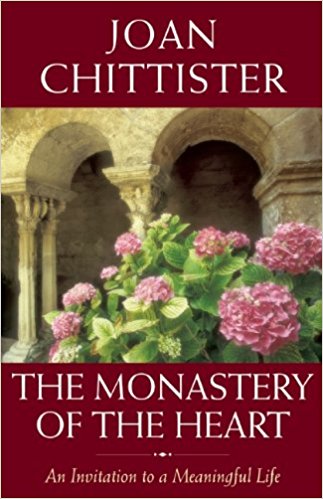 The Monastery of the Heart: An Invitation to a Meaningful Life Joan Chittister (BlueBridge) $13.95 This book is mostly written as loose, poetic reflections and will appeal to those who want a gentle, spiritual reflection. Again, the late Phyllis Tickle wrote, “This marvel of a book sings in the heart and makes the mind quiet with reverence, even as it instructs both with a holy gladness.” Sister Joan has written bunches of books and in this one she poetically reminds us of the central truth that our search for a meaningful life must be connected to this life, our daily life. She evokes Benedict’s Rule as she ruminates on our search, our interior life, our community, our service, our promise, and our spiritual growth. Lovely.
The Monastery of the Heart: An Invitation to a Meaningful Life Joan Chittister (BlueBridge) $13.95 This book is mostly written as loose, poetic reflections and will appeal to those who want a gentle, spiritual reflection. Again, the late Phyllis Tickle wrote, “This marvel of a book sings in the heart and makes the mind quiet with reverence, even as it instructs both with a holy gladness.” Sister Joan has written bunches of books and in this one she poetically reminds us of the central truth that our search for a meaningful life must be connected to this life, our daily life. She evokes Benedict’s Rule as she ruminates on our search, our interior life, our community, our service, our promise, and our spiritual growth. Lovely.
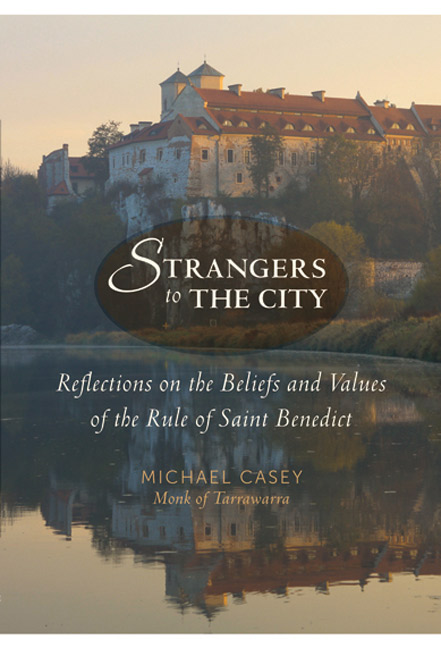 Strangers to the City: Reflections on the Beliefs and Values of the Rule of Saint Benedict Michael Casey (Paraclete Press) $15.95 Casey is a Cistercian Monk of Tarrawarra (in Australia) and has written here an eloquent and incisive overview of the distinctive path of St. Benedict. Casey is one of the leading experts on monastic spirituality (and we have stocked other books of his for years.) This includes thoughtful reflections on the values of asceticism, silence, leisure, reading, chastity, and poverty, “placing each of these ancient beliefs in a vibrant, contemporary context.” This is part of the publisher’s “Voice From the Monastery Series” and it is truly excellent. Highly recommended.
Strangers to the City: Reflections on the Beliefs and Values of the Rule of Saint Benedict Michael Casey (Paraclete Press) $15.95 Casey is a Cistercian Monk of Tarrawarra (in Australia) and has written here an eloquent and incisive overview of the distinctive path of St. Benedict. Casey is one of the leading experts on monastic spirituality (and we have stocked other books of his for years.) This includes thoughtful reflections on the values of asceticism, silence, leisure, reading, chastity, and poverty, “placing each of these ancient beliefs in a vibrant, contemporary context.” This is part of the publisher’s “Voice From the Monastery Series” and it is truly excellent. Highly recommended.
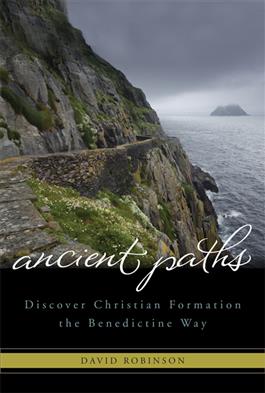 Ancient Paths: Discover Christian Formation the Benediction Way David Robinson (Paraclete Press) $16.99 I reviewed this wonderful book when it first came out, saying it was the best book on Benedict that I ever read. Robinson has advanced theological degrees from Fuller and is a Presbyterian pastor in Oregon. He is a Benedictine oblate of Mount Angel Abbey. Maybe it is Presbyterian impulses, but he helps everyone apply Benedict’s spirituality in their own setting.
Ancient Paths: Discover Christian Formation the Benediction Way David Robinson (Paraclete Press) $16.99 I reviewed this wonderful book when it first came out, saying it was the best book on Benedict that I ever read. Robinson has advanced theological degrees from Fuller and is a Presbyterian pastor in Oregon. He is a Benedictine oblate of Mount Angel Abbey. Maybe it is Presbyterian impulses, but he helps everyone apply Benedict’s spirituality in their own setting.
Brother Benet Tvedten, a Benedictine, and author of the delightful How to Be a Monastic and Not Leave your Day Job, writes of it:
Whether you are engaged in public office or business or a member of AA or a local parish, Ancient Paths applies the values of St. Benedict’s sixth-century monastic Rule to your circumstances in modern life. This author is a pathfinder.
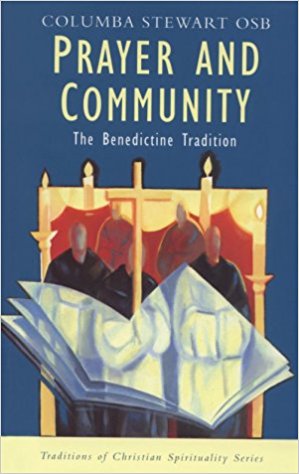 Prayer and Community: The Benedictine Tradition Columba Stewart, OSB (Orbis Press) $18.00 Orbis Press has done a remarkable job offering a major set of books that summarize, clarify, and teach about various religious traditions within the big Body of Christ. From Pentecostals to Quakers, Cistercians to Anglicans, Reformed to Salesian, Wesleyan to Franciscan, this series of books provides a great way to dip in to the broader streams of Christian faith, learning a bit about others we may hear of but not quite understand their distinctives. The large series is edited by the excellent and insightful Phillip Sheldrake; this one is written by a Benedictine monk of St. John’s Abbey who teaches Monastic Studies at St. John’s University in Collegeville, Minnesota. (Stewart, by the way, has a major work on the monk Cassian and another on the desert fathers.) Brief and useful.
Prayer and Community: The Benedictine Tradition Columba Stewart, OSB (Orbis Press) $18.00 Orbis Press has done a remarkable job offering a major set of books that summarize, clarify, and teach about various religious traditions within the big Body of Christ. From Pentecostals to Quakers, Cistercians to Anglicans, Reformed to Salesian, Wesleyan to Franciscan, this series of books provides a great way to dip in to the broader streams of Christian faith, learning a bit about others we may hear of but not quite understand their distinctives. The large series is edited by the excellent and insightful Phillip Sheldrake; this one is written by a Benedictine monk of St. John’s Abbey who teaches Monastic Studies at St. John’s University in Collegeville, Minnesota. (Stewart, by the way, has a major work on the monk Cassian and another on the desert fathers.) Brief and useful.
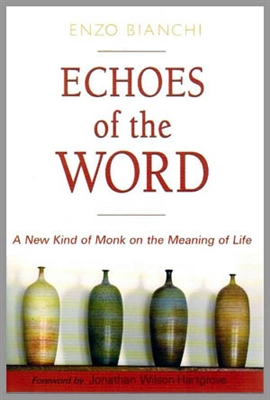 Echoes of the Word: A New Kind of Monk on the Meaning of Life Enzo Bianchi (Paraclete Press) $15.99 Enzo Bianchi was a young Catholic layperson when he founded an ecumenical monastery in Italy called the Bose Community in 1965. He is still the prior there and his books have been translated into many languages. Jonathan Wilson-Hartgove (a Baptist who has written widely about Benedict and his Rule of Life) says:
Echoes of the Word: A New Kind of Monk on the Meaning of Life Enzo Bianchi (Paraclete Press) $15.99 Enzo Bianchi was a young Catholic layperson when he founded an ecumenical monastery in Italy called the Bose Community in 1965. He is still the prior there and his books have been translated into many languages. Jonathan Wilson-Hartgove (a Baptist who has written widely about Benedict and his Rule of Life) says:
This is a different kind of spiritual book… reading this book has felt to me like visiting my dear amma just days before her death. I feel like I’m listening to someone who knows me in my innermost parts. I feel like I’m in the presence of someone who is really alive. And it makes me want to go deeper — to tap into the same living water from which this abba drinks.
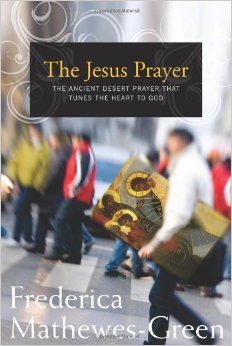 The Jesus Prayer: The Ancient Desert Prayer That Tunes the Heart to God Frederica Mathewes-Green (Paraclete Pres) $18.99 We had the great joy of hearing Frederica again last week at an event at the Roman Catholic Diocese offices in Harrisburg (thanks Fresh Expressions) and we were reminded how much we appreciate her clear, sensible writing. The Jesus Prayer is not particularly Benedictine (having its origins much earlier) but Rod mentions it from time to time, even in his wonderful memoir How Dante Saved My Life. His Orthodox pastor had him learn to recite this prayer and you may have heard Dreher mention this in one of the discussion questions at the Trinity Forum presentation to which we had linked on Facebook. Anyway, this is a good overview of this most mysterious, simple prayer of Eastern Christianity. A conversational question-and-answer format takes the reader through practical steps for adopting this profound practice in everyday life.
The Jesus Prayer: The Ancient Desert Prayer That Tunes the Heart to God Frederica Mathewes-Green (Paraclete Pres) $18.99 We had the great joy of hearing Frederica again last week at an event at the Roman Catholic Diocese offices in Harrisburg (thanks Fresh Expressions) and we were reminded how much we appreciate her clear, sensible writing. The Jesus Prayer is not particularly Benedictine (having its origins much earlier) but Rod mentions it from time to time, even in his wonderful memoir How Dante Saved My Life. His Orthodox pastor had him learn to recite this prayer and you may have heard Dreher mention this in one of the discussion questions at the Trinity Forum presentation to which we had linked on Facebook. Anyway, this is a good overview of this most mysterious, simple prayer of Eastern Christianity. A conversational question-and-answer format takes the reader through practical steps for adopting this profound practice in everyday life.
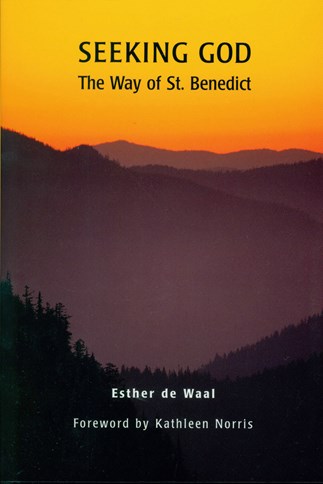 Seeking God: The Way of St. Benedict Esther de Waal (Liturgical Press) $14.99 Esther de Waal is widely recognized as one of the wise, gentle writers about Benedict and we stock many of her books. One reviewer says that she was “one of the pioneers in applying Benedictine spirituality to life outside of the monasteries. She herself is an “Anglican lay woman, married with four sons and a number of grandchildren. She lives on the Welsh Borders where she grew up and spends her time gardening, writing, traveling, and taking retreats. She became interested in Benedictine monasticism as a result of living for ten years in Canterbury and has written several books on the Rule… She holds a PhD. from Cambridge and was given an honorary doctorate from St. John’s University for her contribution to Benedictine studies and for her ecumenical work. She was awarded the Templeton Prize for having started the Benedictine Experience weeks which are now widely held throughout America and England.” This second edition, by the way, has a very supportive and eloquent foreword by Kathleen Norris, author of, among other wonderful memoirs, The Cloister Walk.
Seeking God: The Way of St. Benedict Esther de Waal (Liturgical Press) $14.99 Esther de Waal is widely recognized as one of the wise, gentle writers about Benedict and we stock many of her books. One reviewer says that she was “one of the pioneers in applying Benedictine spirituality to life outside of the monasteries. She herself is an “Anglican lay woman, married with four sons and a number of grandchildren. She lives on the Welsh Borders where she grew up and spends her time gardening, writing, traveling, and taking retreats. She became interested in Benedictine monasticism as a result of living for ten years in Canterbury and has written several books on the Rule… She holds a PhD. from Cambridge and was given an honorary doctorate from St. John’s University for her contribution to Benedictine studies and for her ecumenical work. She was awarded the Templeton Prize for having started the Benedictine Experience weeks which are now widely held throughout America and England.” This second edition, by the way, has a very supportive and eloquent foreword by Kathleen Norris, author of, among other wonderful memoirs, The Cloister Walk.
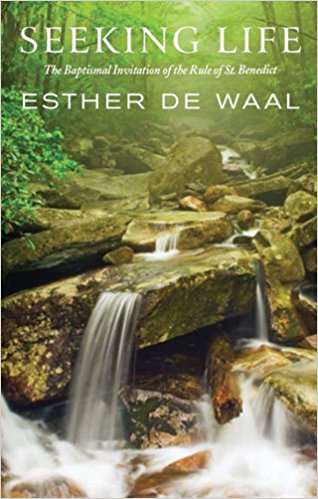 Seeking Life: The Baptismal Invitation of the Rule of St. Benedict Esther de Waal (Liturgical Press) $19.95 This is a very nice book, a small, handsome hardback, that focuses on the prologue to the Rule of Saint Benedict, explaining how it contains “the clues we need to both understand and live by the vows made at our baptism.” Parts of the Rule are actually believed to be based on addresses given to those about to be – or maybe who had recently been – baptized; they are a practical guide to “choosing the road that leads to life.” There’s a lovely long endorsement on the back by Alan Jones. Very impressive.
Seeking Life: The Baptismal Invitation of the Rule of St. Benedict Esther de Waal (Liturgical Press) $19.95 This is a very nice book, a small, handsome hardback, that focuses on the prologue to the Rule of Saint Benedict, explaining how it contains “the clues we need to both understand and live by the vows made at our baptism.” Parts of the Rule are actually believed to be based on addresses given to those about to be – or maybe who had recently been – baptized; they are a practical guide to “choosing the road that leads to life.” There’s a lovely long endorsement on the back by Alan Jones. Very impressive.
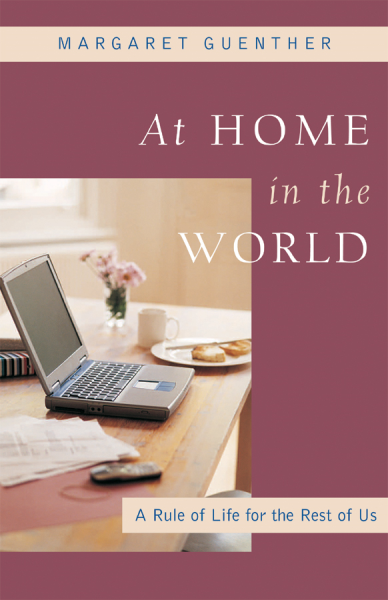 At Home in the World: A Rule of Life for the Rest of Us Margaret Guenther (Seabury Books) $16.00 Anyone familiar with the literature of spiritual formation will know Guenther’s name -her Holy Listening is ca classic. This includes ancient and contemporary takes on the classic monastic vows of poverty, chastity and obedience (in the first half of the book) which is then followed up with a series of shorter essays on “the essentials” for devising a rule of life of your own. This is informed by Benedict’s rule but she isn’t attempting to cling to it, but draw on a variety of monastic rules, insights from various disciplines, encouraging us to find some guidelines for helping us navigate our lives well. Although Guenther visits monasteries often and is a sought after spiritual retreat leader, she writes also as a wife, mother, grandmother, professor, mentor and Episcopal priest.
At Home in the World: A Rule of Life for the Rest of Us Margaret Guenther (Seabury Books) $16.00 Anyone familiar with the literature of spiritual formation will know Guenther’s name -her Holy Listening is ca classic. This includes ancient and contemporary takes on the classic monastic vows of poverty, chastity and obedience (in the first half of the book) which is then followed up with a series of shorter essays on “the essentials” for devising a rule of life of your own. This is informed by Benedict’s rule but she isn’t attempting to cling to it, but draw on a variety of monastic rules, insights from various disciplines, encouraging us to find some guidelines for helping us navigate our lives well. Although Guenther visits monasteries often and is a sought after spiritual retreat leader, she writes also as a wife, mother, grandmother, professor, mentor and Episcopal priest.
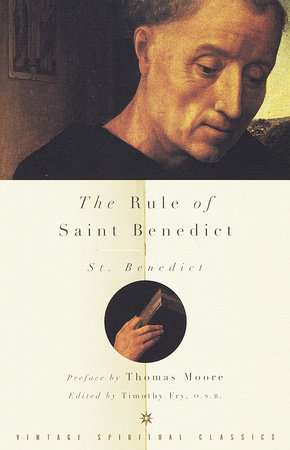 The Rule of Saint Benedict St. Benedict of Nursia (Vintage) $13.95 I don’t know anything about the translation from the original Latin but this seems to be a very reliable edition, the one most people enjoy, with a cool, classy cover. It was edited by Timothy Fry (who translated the famous RB1980) and there is an interesting foreword by Thomas Moore. Highly recommended. By the way, there are bunches in this “Vintage Spiritual Classics” series with uniform covers, from Augustine to the Desert Fathers to Francis to Calvin and Luther. Nicely done.
The Rule of Saint Benedict St. Benedict of Nursia (Vintage) $13.95 I don’t know anything about the translation from the original Latin but this seems to be a very reliable edition, the one most people enjoy, with a cool, classy cover. It was edited by Timothy Fry (who translated the famous RB1980) and there is an interesting foreword by Thomas Moore. Highly recommended. By the way, there are bunches in this “Vintage Spiritual Classics” series with uniform covers, from Augustine to the Desert Fathers to Francis to Calvin and Luther. Nicely done.
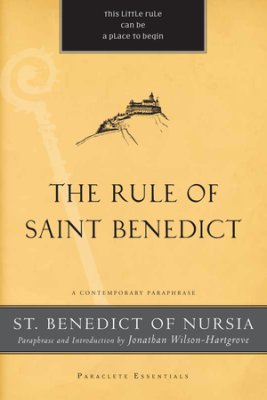 The Rule of Saint Benedict: A Contemporary Paraphrase St. Benedict of Nursia; paraphrased and introduced by Jonathan Wilson-Hartgrove (Paraclete Press) $13.99 This slim volume is in the publishers’ “Paraclete Essentials” series which offers nice paraphrases of classic texts coupled with extensive notes and advise about contemporary application. Jonathan Wilson-Hartgrove graduated from Eastern University where he was pals with Shane Claiborne; he and his wife started Rutba House, one of a network of intentional communities committed to sharing life with those on the margins of society and forming folks able to be involved in peace and justice work. He is an associate minister at St. John’s Baptist Church in Durham. Perhaps you know Jonathan’s co-authored prayer book Common Prayer: A Liturgy for Ordinary Radicals or his lovely The Wisdom of Stability which draws on Benedictine spirituality quite nicely. Highly recommended.
The Rule of Saint Benedict: A Contemporary Paraphrase St. Benedict of Nursia; paraphrased and introduced by Jonathan Wilson-Hartgrove (Paraclete Press) $13.99 This slim volume is in the publishers’ “Paraclete Essentials” series which offers nice paraphrases of classic texts coupled with extensive notes and advise about contemporary application. Jonathan Wilson-Hartgrove graduated from Eastern University where he was pals with Shane Claiborne; he and his wife started Rutba House, one of a network of intentional communities committed to sharing life with those on the margins of society and forming folks able to be involved in peace and justice work. He is an associate minister at St. John’s Baptist Church in Durham. Perhaps you know Jonathan’s co-authored prayer book Common Prayer: A Liturgy for Ordinary Radicals or his lovely The Wisdom of Stability which draws on Benedictine spirituality quite nicely. Highly recommended.
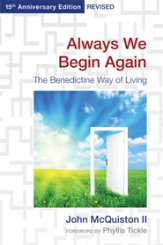 Always We Begin Again: The Benedictine Way of Living John McQuiston (Morehouse) $10.00 This little book is tiny, like a shirt-pocket sized. But it is such a treasure that we sometimes have people buy a bunch to give away. McQuiston has written other nice books on the spirituality of the ordinary, taking a mystical posture into the workworld and finding God in the everyday; here he does a simple paraphase and application of the insights of The Rule. This simple book is described like this: “This book holds timeless appeal for readers who hunger
Always We Begin Again: The Benedictine Way of Living John McQuiston (Morehouse) $10.00 This little book is tiny, like a shirt-pocket sized. But it is such a treasure that we sometimes have people buy a bunch to give away. McQuiston has written other nice books on the spirituality of the ordinary, taking a mystical posture into the workworld and finding God in the everyday; here he does a simple paraphase and application of the insights of The Rule. This simple book is described like this: “This book holds timeless appeal for readers who hunger
for a meaningful and creatively balanced framework for life. It offers a
simple blueprint, based on the Rule of St. Benedict, to order ones time
and create physical and inner space, to step back from the demands and
pressures of the moment, and to step into a place of peace.” Simple, profound, very nice. Released in a 15th anniversary edition a few years back, it now includes a nice little foreword by Phyllis Tickle.
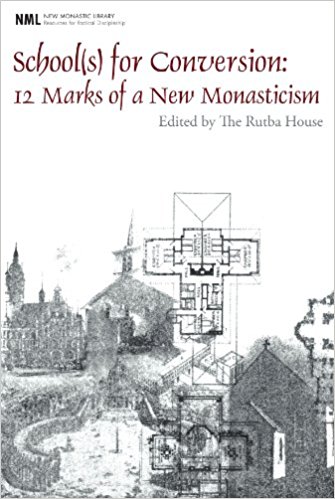 School(s) for Conversion: 12 Marks of a New Monasticism edited by Rutba House (Cascade Books) $24.00 I must restrain myself from saying too much as this may get us a bit farther afield than I want for this post; in a way, this is a lefty/progressive sort of Benedict Option, a call offered a decade ago in this much-discussed manifesto that has generated a handful of intentional communities living together in a world falling apart, serving the poor, standing for justice, and living a deeper spirituality together informed by a Rule of Life. Chapters included pieces by Jonathan Wilson-Hartgrove, Shane Claiborne and others; endorsements are from Berrigan-esque peace activists like Jim Douglas, evangelical mustard seed-sower Tom Sine, Christine Pohl (who wrote Making Room about radical hospitality) and this, from Duke prof Stanley Hauerwas:
School(s) for Conversion: 12 Marks of a New Monasticism edited by Rutba House (Cascade Books) $24.00 I must restrain myself from saying too much as this may get us a bit farther afield than I want for this post; in a way, this is a lefty/progressive sort of Benedict Option, a call offered a decade ago in this much-discussed manifesto that has generated a handful of intentional communities living together in a world falling apart, serving the poor, standing for justice, and living a deeper spirituality together informed by a Rule of Life. Chapters included pieces by Jonathan Wilson-Hartgrove, Shane Claiborne and others; endorsements are from Berrigan-esque peace activists like Jim Douglas, evangelical mustard seed-sower Tom Sine, Christine Pohl (who wrote Making Room about radical hospitality) and this, from Duke prof Stanley Hauerwas:
Whatever future God has for the church, I am convinced the essays in this remarkable book will help us discern that future. Monasticism has always been one of the main means God has used to renew the church. Through some strange miracle God now seems to be calling Protestants to consider what it might mean for them to live in communities that might look very much like monastic communities. Such a call might tempt many toward some kind of romanticism, but one of the remarkable things about these essays is their stark realism. Such a realism is unavoidable not only because of the challenges facing those who are about the formation of communities faithful to God but also because they have lived with one another enough to know this is not going to be easy. So these essays are full of good sense and they help us see the potential of this extraordinary movement. Moreover, each essayist never forgets to remind us that when it’s all said and done, it’s about God who makes it possible for us to live patiently and nonviolently in a world of impatience and violence.
It isn’t exactly Benedictine, but I had to list it… we have each of the several books in the New Monastic Library series.
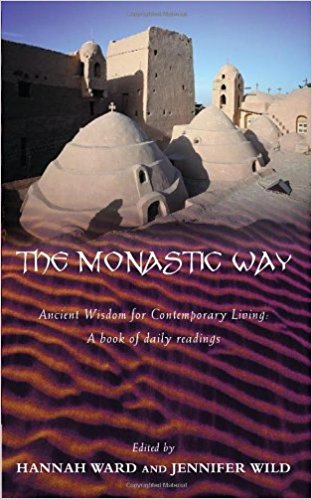 The Monastic Way: Ancient Wisdom for Contemporary Living: A Book of Daily Readings edited by Hannah Ward & Jennifer Wild (Eerdmans) $20.00 First published in the UK and picked by Eerdmans years ago, this book of daily readings brings together short pieces from monks and nuns from a wide variety of Christian spiritual traditions, both Eastern Orthodox and Western. The practicality of this spiritual wisdom shows that the writings of the cloistered are nonetheless nearly universal, writing about things like learning to live with our own and others’ idiosyncrasies or how to cultivate a healthy view of money and possessions or how to find a life-giving balance between work and other sides of life and how to love well. One reviewer said this is “at once practical and sublime.” The two authors have spent part of their lives as members of Anglican religious orders. This is a sturdy, wonderful resource, loaded with words from authors both famous and old monks and ascetics you’ve never heard of.
The Monastic Way: Ancient Wisdom for Contemporary Living: A Book of Daily Readings edited by Hannah Ward & Jennifer Wild (Eerdmans) $20.00 First published in the UK and picked by Eerdmans years ago, this book of daily readings brings together short pieces from monks and nuns from a wide variety of Christian spiritual traditions, both Eastern Orthodox and Western. The practicality of this spiritual wisdom shows that the writings of the cloistered are nonetheless nearly universal, writing about things like learning to live with our own and others’ idiosyncrasies or how to cultivate a healthy view of money and possessions or how to find a life-giving balance between work and other sides of life and how to love well. One reviewer said this is “at once practical and sublime.” The two authors have spent part of their lives as members of Anglican religious orders. This is a sturdy, wonderful resource, loaded with words from authors both famous and old monks and ascetics you’ve never heard of.

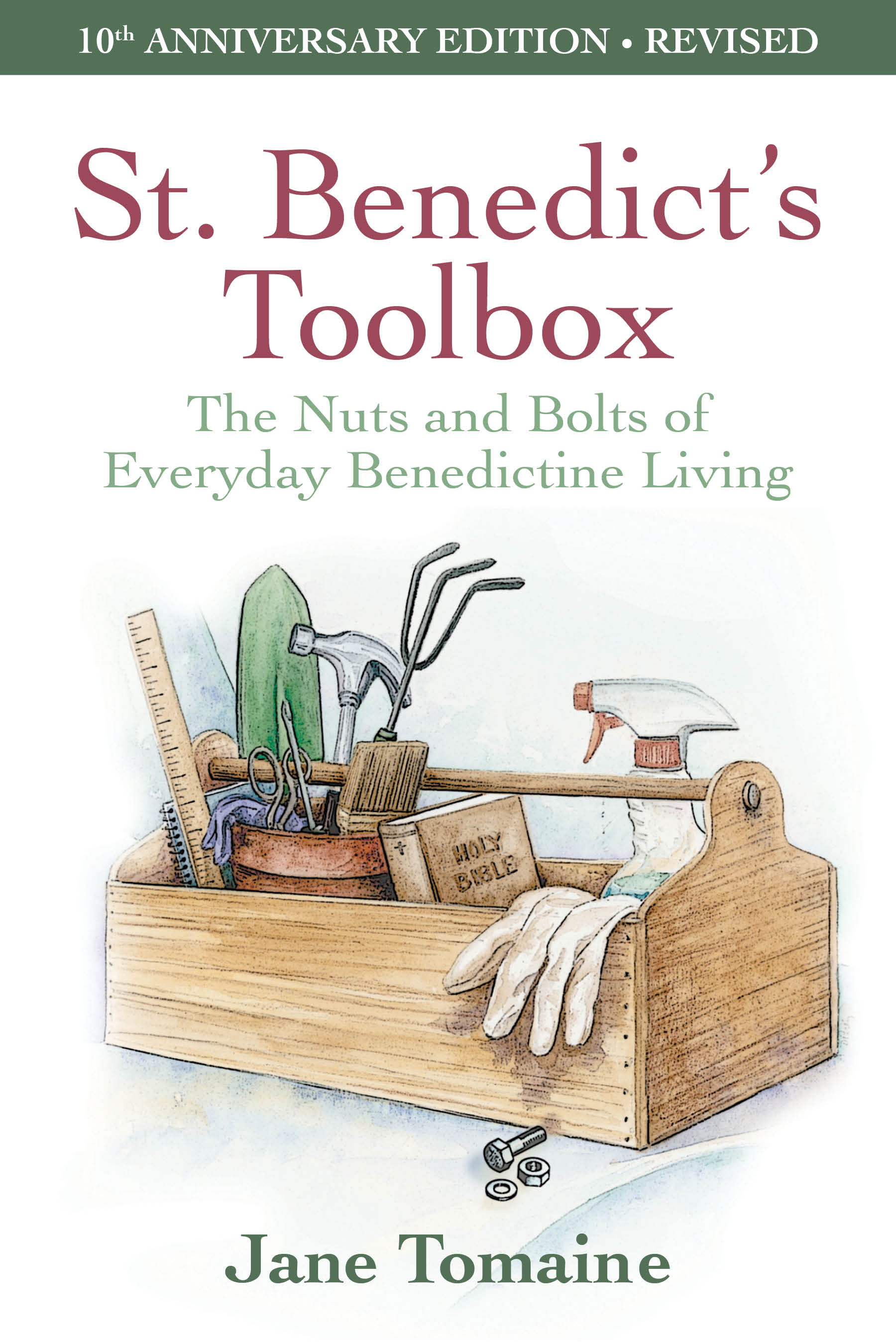 St. Benedict’s Toolbox: The Nuts and Bolts of Everyday Benedictine Living Jane Tomaine (Morehouse Publishing) $24.00 A few years ago this Episcopalian publisher re-issued this in a special “10th anniversary edition” indicating it’s lasting presence; what a lovely, useful books. It’s one of the best introductions we have to the spirit of St. Benedict, helping us all explore how our local congregations and our ordinary lives can be shaped by essential Benedictine ideas.
St. Benedict’s Toolbox: The Nuts and Bolts of Everyday Benedictine Living Jane Tomaine (Morehouse Publishing) $24.00 A few years ago this Episcopalian publisher re-issued this in a special “10th anniversary edition” indicating it’s lasting presence; what a lovely, useful books. It’s one of the best introductions we have to the spirit of St. Benedict, helping us all explore how our local congregations and our ordinary lives can be shaped by essential Benedictine ideas.
We always like the good writing of the popular Barbara Crafton so she is worth hearing; she writes:
Benedict continues to inform Christian life and work; his rule is as fresh and useful for us as it was fifteen hundred years ago. It is not only monks and nuns who benefit from meditating on the Rule — all of us can. Here is an example of such meditation in the truest Benedictine way: practical, realistic, compassionate, and confident in the power of divine love to draw us near.
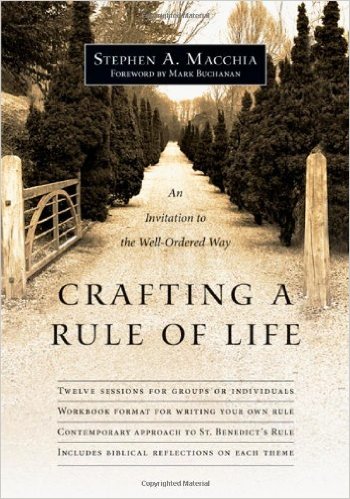 Crafting a Rule of Life: An Invitation to the Well-Ordered Way Stephen A. Macchia (InterVarsity Press) $17.00 This workbook walks us through the reasons for having a personalized “rule of life” and although it is inspired by the Benedictine Rule it isn’t exactly or only about that. It really is a wise workbook for you to consider, work through, interact with, and as you process the material, craft your own rule for your own spiritual benefit. You learn much about the Rule of Saint Benedict but you also are invited to spend time in prayer, reflection on Scripture, and much discernment in order to live out what God is calling you to be and do. Of course, he explores how this can be done in community since we aren’t in this alone. There is a nice foreword by an author I love, Mark Buchanan.
Crafting a Rule of Life: An Invitation to the Well-Ordered Way Stephen A. Macchia (InterVarsity Press) $17.00 This workbook walks us through the reasons for having a personalized “rule of life” and although it is inspired by the Benedictine Rule it isn’t exactly or only about that. It really is a wise workbook for you to consider, work through, interact with, and as you process the material, craft your own rule for your own spiritual benefit. You learn much about the Rule of Saint Benedict but you also are invited to spend time in prayer, reflection on Scripture, and much discernment in order to live out what God is calling you to be and do. Of course, he explores how this can be done in community since we aren’t in this alone. There is a nice foreword by an author I love, Mark Buchanan.
It can be used, by the way, as a 12-week study for a group, or as a personal resource for your own determination of applying St. Benedite’s rule for your own life. Kudos to IVP for bringing this useful tool to us all.
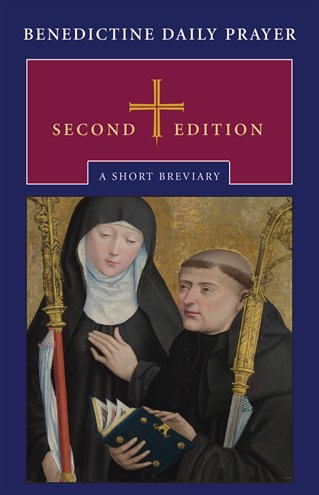 Benedictine Daily Prayer: A Short Breviary compiled and edited by Maxwell Johnson (Liturgical Press) $49.95 This is funny that they call this a “short breviary” as it is over two thousand pages; it is the definitive guide to the prayer practices of Benedictines, using Psalms and hymns and patristic readings. There’s a good guide to it all, six ribbon markers (which you will need) because there are seven daily offices and a lot of page turning. It is considered more “user friendly” than older edition and was compiled by a Lutheran scholar! Just wanted to list this for the record. We, of course, can send it to you or a loved one who wants a very special gift. It comes in a rich leatherflex in a deep burgundy and a beautiful tan.
Benedictine Daily Prayer: A Short Breviary compiled and edited by Maxwell Johnson (Liturgical Press) $49.95 This is funny that they call this a “short breviary” as it is over two thousand pages; it is the definitive guide to the prayer practices of Benedictines, using Psalms and hymns and patristic readings. There’s a good guide to it all, six ribbon markers (which you will need) because there are seven daily offices and a lot of page turning. It is considered more “user friendly” than older edition and was compiled by a Lutheran scholar! Just wanted to list this for the record. We, of course, can send it to you or a loved one who wants a very special gift. It comes in a rich leatherflex in a deep burgundy and a beautiful tan.
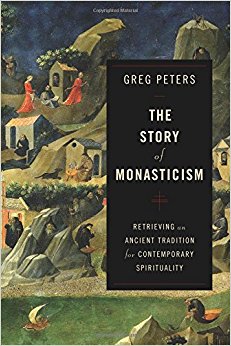 The Story of Monasticism: Retrieving an Ancient Tradition for Contemporary Spirituality Greg Peters (Baker Academic) $22.99 There are several major works tracing the history of various sorts of monasticism within church history and this is doubtlessly the best. Fr. Abbot Denis Farkasfalvy (abbot emeritus of the Cistercian Abbey of Our Lady of Dallas) says, “I have never met a Protestant theologian – evangelical or mainline – who speaks about monastics with as much competence and easy as Greg Peters…” He calls it “an exceptional book and will be an eye-openers for both Protestants and Catholics, laity and clergy alike.”
The Story of Monasticism: Retrieving an Ancient Tradition for Contemporary Spirituality Greg Peters (Baker Academic) $22.99 There are several major works tracing the history of various sorts of monasticism within church history and this is doubtlessly the best. Fr. Abbot Denis Farkasfalvy (abbot emeritus of the Cistercian Abbey of Our Lady of Dallas) says, “I have never met a Protestant theologian – evangelical or mainline – who speaks about monastics with as much competence and easy as Greg Peters…” He calls it “an exceptional book and will be an eye-openers for both Protestants and Catholics, laity and clergy alike.”
It narrates the history of monasticism with verve and clarity, even though this is a massive and sweeping project. There are several chapters under each era, which are broken up into Antony to Benedict, Benedict to Bernard, Bernard to Luther, and, in Part IV, Luther to Merton. There is a fine Epilogue called “Monasticism Today and Tomorrow.” Peters earned his PhD at the University of St. Michael’s College in Toronto, is an Anglican priest and Benedictine oblate and a professor at both the Torrey Honors Institute at Biola and adjunct at St. John’s School of Theology in Minnesota and at Nashotah House Theological Seminary in Wisconsin. Thanks be to God!
BookNotes
DISCOUNT
ANY ITEM MENTIONED
10% off
order here
takes you to the secure Hearts & Minds order form page
just tell us what you want
inquire here
if you have questions or need more information
just ask us what you want to know
Hearts & Minds 234 East Main Street Dallastown, PA 17313
717-246-3333
